Read Time: 5 Minutes Subscribe & Share
Science Intrudes
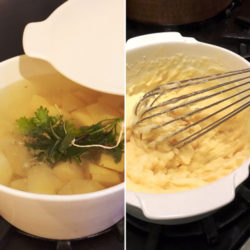 It may have been in The Joy Of Cooking where I read that when you boil potatoes, you start them in cold water. This piece of advice among many gems from Irma Rombbauer and her mother, a most unlikely pair to have written a classic American cookbook. I have followed this culinary instruction religiously without really knowing why. I just recently discovered the reason, while reading about boiling potatoes in Italian. My son-in-law had handed me an article from Le Scienze about the difference that a small amount of an acid or alkaline substance makes in preparing this kitchen staple. Potatoes are clearly a close second to pasta on his list of dietary requirements.
It may have been in The Joy Of Cooking where I read that when you boil potatoes, you start them in cold water. This piece of advice among many gems from Irma Rombbauer and her mother, a most unlikely pair to have written a classic American cookbook. I have followed this culinary instruction religiously without really knowing why. I just recently discovered the reason, while reading about boiling potatoes in Italian. My son-in-law had handed me an article from Le Scienze about the difference that a small amount of an acid or alkaline substance makes in preparing this kitchen staple. Potatoes are clearly a close second to pasta on his list of dietary requirements.
Le Scienze is an Italian magazine similar to Scientific American, which I will have to shamefully admit I never looked at, even though my older brother devoured each issue. My taste and allowance ran more to movie magazines. This brother later worked at NASA for 55 years, whereas I can tell you which film made Sal Mineo famous. He also has a scientific interest in pushing my cooking skills to the limit. One of my favorite scientific trials with him involved A-5 beef from Japan. The journey was tortuous and hilarious, but the results were, indeed, sublime.
A French Fry Digression
To be fair, though, I did become somewhat scientifically interested in perfecting my technique in the making of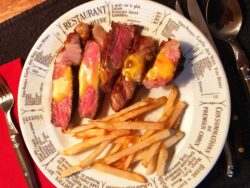 French fries. My current version is adapted from Daniel Boulud with a finish I learned from the first cookbook by Erin French, the owner of the famous The Lost Kitchen in Maine. I paid dutiful attention to frying temperatures, different frying fats and which potato produced the best fries. I still think Russets are the best choice, due to their high starch content, and am hoping to find them here in Bologna. It’s disheartening to know that there are several thousand varieties of potatoes, but no matter where you are, you can get your hands on only two or three. So far, no Russets in reach.
French fries. My current version is adapted from Daniel Boulud with a finish I learned from the first cookbook by Erin French, the owner of the famous The Lost Kitchen in Maine. I paid dutiful attention to frying temperatures, different frying fats and which potato produced the best fries. I still think Russets are the best choice, due to their high starch content, and am hoping to find them here in Bologna. It’s disheartening to know that there are several thousand varieties of potatoes, but no matter where you are, you can get your hands on only two or three. So far, no Russets in reach.
Unrelated, but still circulating in the ether of the internet is a famous video of Michael Pollan giving a lecture in the UK on the horrors of industrial farming. As an example of dangerous substances used by McDonalds in the farming of the exclusive potato for their fries. he discusses the use of Monitor, an extremely toxic pesticide to stop an aphid from creating blemishes in the potato interior. Companies such as McDonalds “voluntarily” ceased using Monitor in 2009 after both the EU and the US banned the pesticide. We are assured by the company’s website that their farms only use pesticides that comply with current EPA standards. I also remember when McDonalds used to fry their potatoes in beef tallow….those were the good old days. It remains my preferred way to make French fries too. Until I left for Italy, I bought beef tallow from South Chicago Packing – which they no longer sell. Note to other French fry aficionados, I tried their Wagyu tallow, and we felt that it did not deliver as well as their regular beef tallow. Just trying to be helpful here.
Boiling Points
But back to boiling our spuds: The reason potatoes should start their cooking journey in cold water is that the starch on the potato’s surface reacts immediately with hot water, so that by the time the center of the potato is cooked to the desired doneness, the outside is soft and mealy. By putting them in cold water, you allow the potatoes to cook more gradually so that the core catches up with the exterior. If prepping your potatoes in advance, soak them in cold water with a lemon slice or splash of clear vinegar to keep the discoloration (caused by oxidation) at bay.
Returning to the article in Le Scienze, which tells you to add a teaspoon or two of vinegar to 2 quarts of your cooking water plus the salt you normally add. Some of the starch is drawn out 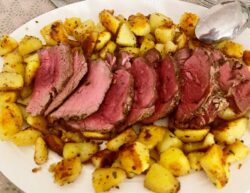 and forms a film around the potato exterior. This will keep the potato smoother on the outside until you get the desired doneness when you test the interior with a fork. This is perfect for a potato salad preparation, or for smooth oven-roasted potatoes, which is my preference. I have never tried blanching the sliced potatoes in this way with my precious frites, but in a piece in Chowhound, the author advised that parboiling the potatoes in vinegar-enhanced water makes the potatoes maintain their shape better, not only for fries, but also for American scalloped potatoes or French potato gratin.
and forms a film around the potato exterior. This will keep the potato smoother on the outside until you get the desired doneness when you test the interior with a fork. This is perfect for a potato salad preparation, or for smooth oven-roasted potatoes, which is my preference. I have never tried blanching the sliced potatoes in this way with my precious frites, but in a piece in Chowhound, the author advised that parboiling the potatoes in vinegar-enhanced water makes the potatoes maintain their shape better, not only for fries, but also for American scalloped potatoes or French potato gratin.
Baking soda produces a different result. It draws out the pectin in the potatoes and softens the exterior. The released starch then creates sort of a slurry on the outside that many YouTube roasted potato fanatics adore. Baking soda gives more of a British Sunday roast potato effect, with little crisp shards of potato starch giving an almost shaggy look to the finished spuds . And obviously, baking soda will create a smooshier potato cube when making mashed potatoes. Although nothing beats a ricer for the best mashed potato results.
As a coda to this brief, somewhat scientific discussion of how to bring out the best in your bag of potatoes, this engaging video from America’s Test Kitchen explains it well…and it may even change your approach to potatoes for Thanksgiving.
Shop Items Mentioned in the Post
By submitting this form, you are consenting to receive marketing emails from: Kitchen Detail, Via de'Falegnami 5, Bologna, 40121, http://www.lacuisineus.com. You can revoke your consent to receive emails at any time by using the SafeUnsubscribe® link, found at the bottom of every email. Emails are serviced by Constant Contact
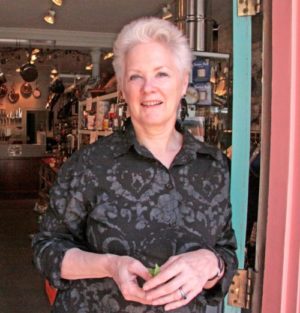
Kitchen Detail shares under the radar recipes, explores the art of cooking, the stories behind food, and the tools that bring it all together, while uncovering the social, political, and environmental truths that shape our culinary world.
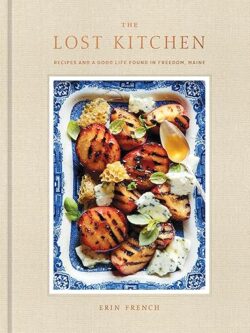





Nancy, your articles are fun, but the ads are NOT! Why not pay the extra fee for NO ADS on your site. 😉
This was THE perfect read for me this morning! Having dinner guests Friday evening. Making twice-baked potatoes today to serve with grilled steaks. Armed with this great research and info, I’m off to the kitchen confident of yummy 😋 success. Thanks, Nancy. XO Mary